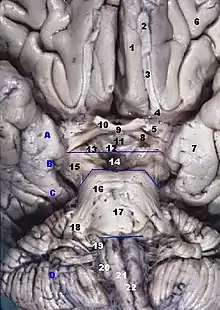peduncle
English

Agave, showing the giant peduncle of its inflorescence

Human brainstem showing some of the connecting bundles of neurons, structures known as peduncles
Etymology
From Late Latin pedunculus, from pedis, genitive of pēs (“foot”).
Pronunciation
- IPA(key): /pɪˈdʌŋ.k(ə)l/[1]
Audio (Southern England) (file)
Noun
peduncle (plural peduncles)
- (botany) The axis of an inflorescence; the stalk supporting an inflorescence.
- (botany) A short stalk at the base of a leaf or reproductive structure.
- 1992, Rudolf M[athias] Schuster, The Hepaticae and Anthocerotae of North America: East of the Hundredth Meridian, volume V, New York, N.Y.: Columbia University Press, →ISBN, page 5:
- On fertilization, the archegonia form obyriform calyptrae that are distinctly narrowed at base to form a stalk or peduncle; this does not occur in other Hepaticae.
- (anatomy) A bundle of neurons connecting different parts of the brain.
- (anatomy) In arthropods, the base segments of an antenna or stalk-like structures such as the peduncles of some barnacles
- (anatomy) In vertebrates, the base of any relatively massive anatomical member connected to the body by a narrower section. Cf. caudal peduncle of fishes.
- (anatomy) A stem attaching a mass of tissue (such as a polyp) to the body.
- (zoology) A collection of nerves in the appendage of an animal (such as the tip of a dolphin's tail).
Related terms
Translations
botany: axis or supporting stalk of inflorescence
|
botany: short stalk at the base of a leaf or reproductive structure
bundle of neurons connecting parts of brain
anatomy, arthropoda: base segments of an antenna or stalk-like structures
anatomy: stem attaching a mass of tissue to the body
zoology: collection of nerves in the appendage of an animal
|
References
- “peduncle”, in Lexico, Dictionary.com; Oxford University Press, 2019–2022.
Further reading
- Douglas Harper (2001–2024) “peduncle”, in Online Etymology Dictionary.
 peduncle (botany) on Wikipedia.Wikipedia
peduncle (botany) on Wikipedia.Wikipedia  peduncle (anatomy) on Wikipedia.Wikipedia
peduncle (anatomy) on Wikipedia.Wikipedia
This article is issued from Wiktionary. The text is licensed under Creative Commons - Attribution - Sharealike. Additional terms may apply for the media files.
_-_NHM_London.jpg.webp)